Signs Of Trouble For Cory Booker
Cory Booker's campaign is starting to show some of the same signs of collapse that Kamala Harris's did.
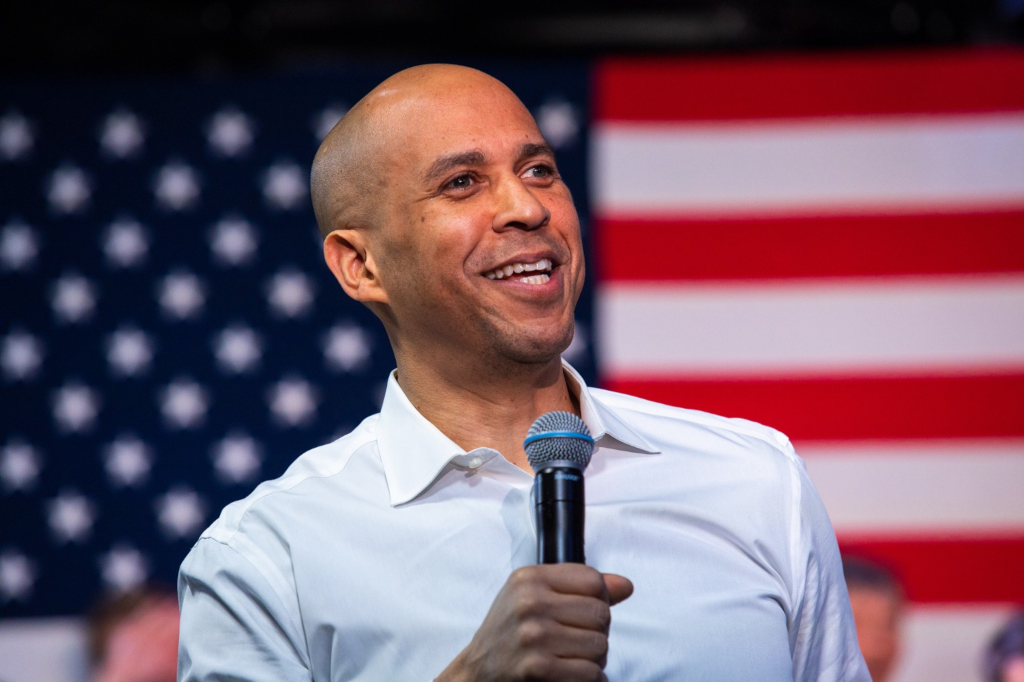
Typically, the first sign that a campaign is on its last legs is when you start reading that a campaign is ‘scaling back operations’ or concentrating its efforts on one state. It happened with Kamala Harris when it was reported she was cutting back operations in other states, particularly New Hampshire, and concentrating on Iowa. Now, the same thing appears to be happening with Cory Booker:
CONCORD, N.H. — Cory Booker’s campaign held five events in New Hampshire this week. But one thing was notably missing from all of them: Cory Booker himself.
With his campaign struggling to gain traction in early state polls, Booker has gone all-in on Iowa and South Carolina — and all but vanished from New Hampshire.
While his campaign denies it’s pulling out of the first-in-the-nation primary state, local Democrats have taken notice of his reduced presence.
“It’s increasingly obvious that candidates that frequent N.H. venues, living rooms and larger, are those that pull ahead in support here,” Democratic former state Senate President Sylvia Larsen said in an email. “If you’re a candidate that avoids this close-up scrutiny it will reflect in poll numbers. NH voters track and support those willing to participate in close conversation with us. Cory is an inspirational orator who, perhaps due to lack of specificity, has not resonated with our voters. While Booker’s departure from NH is understandable, his NH results will reflect this early departure.”
Booker hasn’t been to New Hampshire since before Thanksgiving. While he had three events scheduled for Friday, he missed them because he had the flu, according to his campaign.
The senator also recently downsized his New Hampshire operation, which included significantly reorganizing local staffing and closing an office in Portsmouth — one of the bluest parts of the state. They now have two campaign offices left, in Manchester and Nashua, the two largest cities. By comparison, top-tier campaigns have more than a dozen offices throughout the state.
Spending figures underscore the early state triage: His campaign has revealed plans to invest $500,000 into TV and digital advertising in Iowa, but nothing similar is planned for New Hampshire at the moment. The super PAC affiliated with Booker, United We Win, has only purchased TV ads so far in Iowa, where it recently spent about $200,000 in Des Moines and Cedar Rapids.
Booker hasn’t written off New Hampshire entirely — he recently secured his field-high 117th endorsement Tuesday when 14 activists announced their support for him.
And some of the state’s top elected officials who have endorsed Booker question whether polling showing him at 1 percent in the first-in-the-nation primary state is accurate — echoing a point the candidate makes himself.
But with limited resources and the clock ticking toward the Feb. 3 Iowa caucuses, he’s forced to rely on local surrogates to spread his message. In interviews with half a dozen state senators and representatives who are supporting Booker, the lawmakers insisted the lack of face time in New Hampshire won’t hurt his chances.
“I think that you’ll see us just go into overtime,” said state Sen. Jon Morgan. “We’ll be working overtime to amplify that message and make sure that voters hear about Cory.”
NJ.com political writer Jonathan Salant lays out Booker’s alleged path to victory:
Here’s the cheery path to victory his campaign manager Addisu Demissie lays out:
Booker has a long line of endorsements in Iowa from local politicians and an even longer list of activists knocking on doors and burning up the phones to get people to the caucuses. He’s also got a strong ground game in New Hampshire. And Booker, who has raised $3 million since last month’s debate, has money for TV advertising.
If voters jumping from candidate give him a decent showing in Iowa, Booker would be viewed as the the surprise of the night and a trending candidate. A similar scenario in New Hampshire would bring momentum — and more money. Then comes South Carolina and Nevada, states with high percentages of minority voters. Stay in that long, and who knows?
And this comeback could begin this week, the campaign claims. As the others debate in California Thursday night, the New Jersey senator will be in Iowa trying to grab votes. He’s got a bus and will travel around for five days.
Of course, all this means Booker has to leapfrog so many fellow Democrats so far ahead of him who are trying to do the same thing. And Booker’s poll numbers in the early states are as low as his national numbers as voters have viewed him as a guy they like but don’t favor.
“He’s too far back in the pack,” said Democratic consultant Glenn Totten. “The idea that Senator Booker is going to take Iowa by storm, that’s fantasy.”
Booker’s campaign points out that most Iowans have yet to fall in love with their first choice of candidates. Almost six in 10 likely caucus goers in the most recent Quinnipiac University poll said they might change their minds, including 68 percent of those now backing Elizabeth Warren and 80 percent of those supporting Pete Buttigieg.
“A lot of people will answer a poll question but they haven’t really made up their minds yet,” said Democratic consultant Peter Fenn. “They haven’t signed on the dotted line with a candidate.”
Then again, even if Iowans abandon front-runners Warren, Buttigieg, Joe Biden or Bernie Sanders in significant numbers, there’s no guarantee that they will flock to Booker.
In fact, just 4 percent of those polled by Quinnipiac named Booker as their second choice.
Booker has two months to convince them.\
“A week is a lifetime in politics,” said Ben Dworkin, director of Rowan University’s Institute for Public Policy and Citizenship. “We’re not voting next week, we’re voting in eight weeks. People therefore have time to switch and what we’ve said is this is a pretty fluid electorate.”
Booker’s campaign likes to point out that at this same point in 2003, John Edwards was at 5 percent in Iowa but wound up finishing second.
Edwards, of course, did not go on to win the Democratic nomination that year, although he did become John Kerry’s running mate in their unsuccessful bid to deny George W. Bush a second term. One suspects that Booker will suffer a similar fate, although it is unlikely he’ll be a running mate next year no matter who the nominee might be.
This isn’t the first time we’ve seen signs of trouble for Booker. Back in September, Booker announced that his campaign needed an immediate infusion of cash to survive. The campaign reached that goal and actually managed to raise a somewhat impressive $6.4 million in the third quarter. Notwithstanding that, Booker’s performance in the polls has been less than impressive. In national polls, for example, he’s averaging 2.0%, a number that he has lingered at for most of the year. Things aren’t much better in the early states. In Iowa, he’s running a 2.0% average, while he’s running under 2.0% in both New Hampshire and Nevada. His best-performing state is South Carolina where he’s averaging 3.0%. Finally, he is running a 2.0% average in the important Super Tuesday state of California. Because of this, Booker will not be among the candidates at next week’s debate, and he’s unlikely to qualify for any of the debates in the new year. All of this is a sign of a campaign that never really took off, and this latest news is just further confirmation of that fact.
As I said, we saw this same thing with Kamala Harris and it doesn’t bode well for Booker. The first reports of trouble emerged in late October that the Harris campaign was cutting spending and staff due to disappointing fundraising revenues. Within days came the news that the campaign was cutting back in New Hampshire, followed by the inevitable reports about internal fighting in the campaign as various factions sought to blame the other for the campaign’s failures. Finally, at the start of December, the end came as Harris decided to drop out. The time between the first reports of trouble for Harris and the end was just 34 days. Will it be the same for Booker, or will he try to hang on at least through the Iowa Caucuses? Only time will tell but the odds are that his campaign is not long for this world.

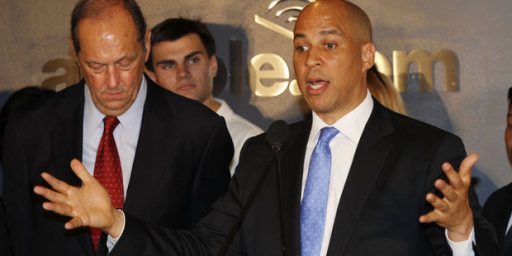
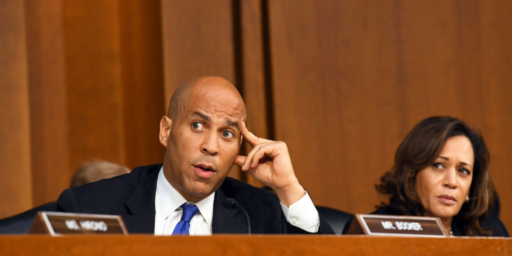
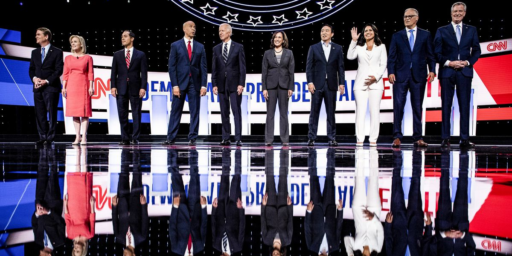
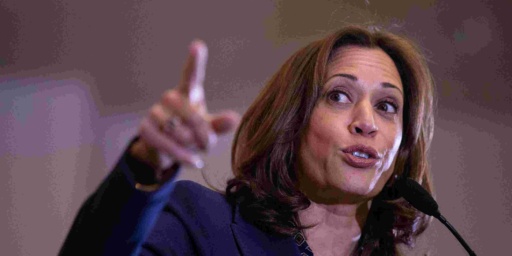
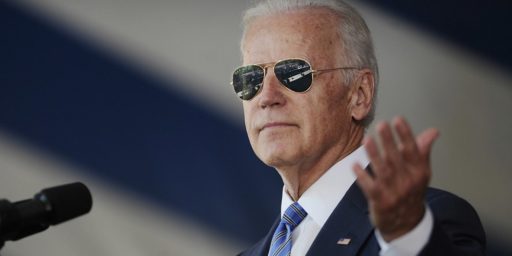
I don’t think it can really be signs of trouble if there have never been signs of success.
I like Cory Booker, but he has not struck a chord this cycle. It’s a shame — I think he has a lot to offer. He doesn’t even get to the level of running a bad campaign, he just completely doesn’t fit the moment.
A pity. Booker was one of the few I liked. Pro-business. Pro-charter. Pro-nuclear. Pro-criminal justice reform. One of the few who seemed to grasp these issues pretty well.
Failure to catch on. It’s not a death sentence for future endeavors.
I quite like Booker.
Next go ’round, he is eminently set up.
I suppose the good news is that Harris and Booker will be front and centre for the impeachment trial. They are both pretty good at that stuff.